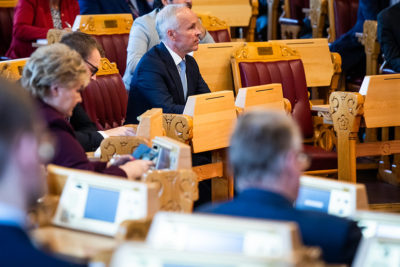The Norwegian government’s revised state budget includes tax relief measures that some fear will unduly stimulate the oil industry. Finance Minister Jan Tore Sanner is most keen, however, to preserve jobs and ease the current pain and uncertainty of low oil prices, while some Members of Parliament want to do even more to aid oil companies.

Sanner’s own finance ministry was highly skeptical towards changing oil tax policy, but he and the government ultimately proposed a temporary measure. It includes letting oil companies deduct the costs of new offshore investments this year and next, instead of spreading the investment costs over six years.
That’s meant to stimulate investment in new projects during the current economic slowdown. That in turn could generate jobs for Norway’s large oil supply sector, and maintain Norwegian innovation and competence in the offshore industry.
Sanner insists the tax relief won’t reverse efforts to restructure Norway’s economy and make it less dependent on the oil and offshore industries. “This will only ease the fall (of tougher times in the oil industry because of low demand and even lower oil prices), not hinder restructuring,” Sanner claimed even before he presented the ministry’s revised state budget for this year that contains NOK 100 billion worth of oil tax relief. The government’s proposal will merely give oil companies “a possibility to invest more.”
A professor at business school NHH (Norges Handelshøyskole) who’s recently taken over as research director at the state statistics bureau SSB isn’t so sure. “Everyone agrees we must diversify away from oil over time,” Linda Nøstbakken told news service E24 this week. “Politicians should not use tax rules to delay that process.”
She’s not buying the claim that more oil investments are needed to keep the offshore yards and engineering firms busy. “The labour force in the supply sector has high competence that can be used in other ventures,” Nøstbakken said. She and others also worry that the tax relief measures may prompt oil firms to invest in new offshore projects that won’t be profitable, leaving other taxpayers to take the losses.

Sanner’s tax incentives to generate more projects may even be enhanced in Parliament, by opposition parties that want to keep supporting the oil industry despite climate concerns, diving demand and low prices for oil, and revelations in the past week of how Norway’s state oil company Equinor has lost around NOK 200 billion on oil projects in the US. Neither the Progress Party nor the Center Party, for example, seem very concerned about that, and instead want to provide even more attractive tax terms for oil companies.
Several of the companies themselves, meanwhile, haven’t been enthusiastic about the government’s tax relief proposals. They fear bigger tax bills once the tax deferments expire, while uncertainty over oil prices and future demand for oil can leave them with higher costs.
Newspaper Aftenposten reported this week that at least one company, Okea, stands to gain from the new tax rules, not least if they’re enhanced. Among Okea’s founders was Ola Borten Moe, deputy leader and a former oil minister for the Center Party during the last left-center government. Moe still works for and owns a 0.5 percent stake in Okea, which invests in licensed oil fields that have found oil and helps develop them.
Deny any conflicts of interest
Center Party leader Trygve Slagsvold Vedum sees nothing wrong in pushing for even more tax relief that would benefit oil companies like his deputy leader’s. Vedum cites a long history of support for the oil industry and claimed Moe hadn’t been part of forming the party’s current oil tax policy.
Moe, who’s also a farmer, sent a message to Aftenposten claiming he has more money invested in “tractors, agricultural equipment and farm property” than he has in his Okea shares. “Hindering massive unemployment and securing income for the country in the future should be important for the entire political milieu,” Moe wrote as he fended off questions of any conflict of interest.
Tax relief for the oil industry is due to be debated as part of state budget negotiations. Current Oil Minister Tina Bru of the Conservative Party told E24 on Thursday that she aims to use the temporary changes in oil tax policy to push the industry in a “greener” direction. She stressed the situation at present was “extraordinary,” with the Corona virus crisis wiping out demand for oil and a price war cutting oil prices even more.
Economic restructuring will continue gradually, she said, not through any “crash landing” caused by Corona. Offshore supply companies “must gradually find new markets and apply their competence in greener areas. That won’t happen if they go bankrupt this year or next.”
NewsInEnglish.no/Nina Berglund

